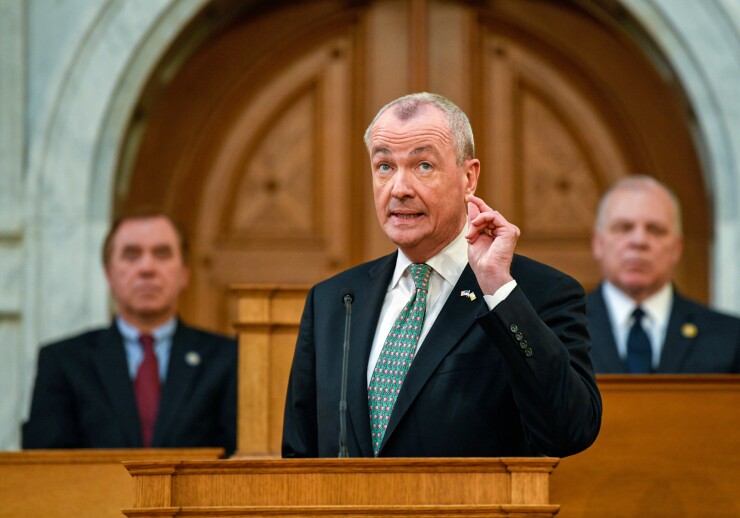The "millionaire’s tax" to fund New Jersey Gov. Phil Murphy’s $38.6 billion budget proposal could create fiscal risks for the state, critics say.
The Democratic governor is banking on raising a projected $447 million for his

State Senate Budget Chair Paul Sarlo, D-Wood Ridge, cautioned Tuesday that increasing taxes on wealthy earners may be “volatile” strategy because of near-term prospects for another economic downturn.
“A sizable surplus will help, but the millionaires’ tax could make economic and fiscal conditions worse,” Sarlo said in a statement after holding a Senate budget hearing Tuesday with State Treasurer Elizabeth Maher Muoio and the Office of Legislative Services. “An added surcharge on high income earners going into an economic slowdown is unreliable and likely counterproductive.”
Regina Egea, president of business-oriented policy group Garden State Initiative, noted that a January study by Wealth-X, a consultancy focused on marketing to high-net-worth customers, said New Jersey is already losing thousands of high-income earners yearly because of high taxes.
Egea added that the tax would only increase New Jersey’s dependence on higher income earners to produce revenue growth on top of the volatility an economic downturn could create. The Garden State’s gross income tax fell 16% from 2008 to 2011 when the last recession hit, according to Egea, who was a chief of staff under previous Gov. Chris Christie, a Republican, and Christie's state Treasurer, Andrew Sidamon-Eristoff.
“We need to address the spending rate and there are ample opportunities to take on substantial components of our state government spending that will improve New Jersey’s competitiveness rather than lessen it as an expanded millionaire’s tax will inevitably result in,” said Egea.
A March 20 Moody’s Investors Service report said that states that rely on revenue from top earners like New Jersey are vulnerable to income volatility, and that raising taxes on the wealthy is more challenging after 2017 federal tax law changes capping deductions for state and local taxes at $10,000. Moody’s analyst Matthew Butler noted that New Jersey’s reserves were only at 2.7% of revenues for the 2018 fiscal year providing “minimal cushion” to counteract large tax collection declines from the wealthiest taxpayers.
“Rising incomes of these high earners over the past several years has benefited state budgets, but inevitable wide swings in these taxpayers' incomes will likely drive much higher revenue volatility going forward,” Butler wrote. “A large revenue loss that is not covered in its entirety by state reserves could effectively be passed to lower levels of government.”
Despite the warnings, New Jersey isn't the only place where "millionaire's tax" proposals are on the table. In Illinois, Gov. J.B. Pritzker wants to replace the state's flat income tax with a graduated rate structure that raises rates on the highest earners. New York's recent
New Jersey’s reserve position has remained low since the 2008 recession due largely to a growing pension burden that triggered 11 rating downgrades under Christie. The Garden State's general obligation debt is rated A3 by Moody’s, A-minus by S&P Global Ratings and A by Fitch Ratings and Kroll Bond Rating Agency, all with stable outlooks.
Murphy’s budget proposal would have an estimated $1.2 billion
Sarlo asked Muoio during the hearing if the Murphy administration would consider $447 million in “sustainable savings” to offset a need for the millionaire’s tax if the legislature determines possible spending reductions. While the treasurer stated that the administration is open to new savings, revenue is needed to fund increased pension payments and public school funding.
“We need a balance of sustainable revenues and savings,” State Treasurer Elizabeth Maher Muoio said in response to similar sentiments from Sarlo earlier in the day. “That is what this budget is proposing, and it proposes an increased surplus so that we could get through times where we may experience volatility.”





